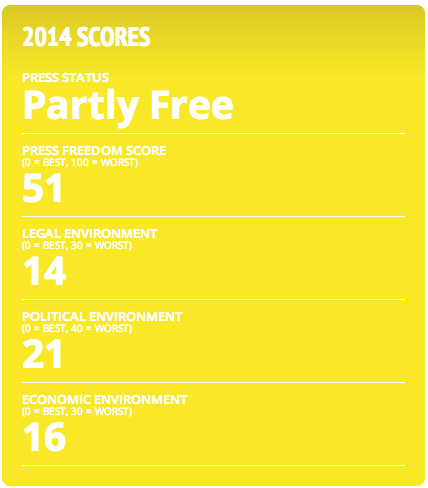In Argentina, there are plenty of news outlets that freely criticize and question the government, which many would argue is a sign of a healthy media environment. According to Freedom House’s 2014 figures for Freedom of the Press, however, Argentina only ranks as “partly free.”
There are many contributing factors to this ranking- huge fines for libel and slander, lack of a federal freedom of information law, attacks against the media- but one of the biggest contributors is the hostile relationship between the government and critical media outlets, which is fueled by the Argentine government’s consistent use of soft censorship.
Soft censorship comes in different forms, including direct payments to journalists for favorable coverage and government pressure on private businesses to advertise in government-friendly media while withholding advertising from government-critical media.
In Argentina, both local and federal governments use the placement of public advertisements in print and broadcast news outlets as a kind of carrot-and-stick. Outlets that favorably cover the government reap the benefits of public ad revenue, while those that are more critical of the government don’t.
According to Eduardo Bertoni, Director of the Center for Studies on Freedom of Expression and Access to Information at Palermo University School of Law in Buenos Aires, “the allocation of public funds for public advertising is very arbitrary in Argentina.” This kind of financial pressure for favorable coverage is “very clear” to people paying close attention to the media environment in Argentina. However, this isn’t a new phenomenon and is actually something that occurs all around Latin America.
In a 2011 report to CIMA, for example, a radio journalist from Nicaragua says, “The editors don’t need to say anything, because we all know that if we say certain things about the government, we could all lose our jobs if they stop paying the official spots… We know where the lines are already. We know we can’t really accuse the government of many of the corruption stories we know about because we would all be on the street.”
The fact that soft censorship like this is so rampant and influential in Argentina begs further scrutiny of the new media’s business model. What about this business model encourages government soft censorship? Can an alternative, more sustainable model be adopted?
According to Bertoni, the news media in Argentina follow the commercial business model of news media in the United States. A flaw in the Argentine model, however, might be that too much of the available ad space is sponsored solely or very heavily by the federal and local governments. Bertoni notes that if more news media in the country diversify the sources of their ad revenue, such as bringing in more private commercial advertising, this may reduce the effects of soft censorship. A challenge, however, would be how to encourage the private sector to invest more in these ad spaces.
These challenges don’t mean that independently-funded news media in Argentina can’t or don’t exist. Clarin, for example, isn’t only the country’s largest newspaper, but it has successfully been independently funded for almost the last 70 years. Clarin is an important example of what’s possible for news media in Argentina because of its very tumultuous relationship with the Kirchner administration, of which it is very critical.
In February 2014, regulators approved a plan that would redistribute the media licenses of the Clarin conglomerate (of which the Clarin newspaper is part). The Kirchner administration argues that this is a way to ensure anti-monopoly practices, while supporters of Argentina’s largest media group believe that this is “an attempt to silence dissident voices in the country.”
For now, it seems as if soft censorship in Argentina is here to stay. Until more news outlets can be independently funded, there will continue to be heavy reliance on public ad revenue. As the Clarin case demonstrates, however, the Argentine government isn’t shying away from going after independently funded media, as well.
Listen to the podcast above to hear more of Eduardo Bertoni’s insights into the state of soft censorship in Argentina.
Podcast Music: “ABEL FLEURY Milonga” by Guitarreando, licensed under Creative Commons


Comments (0)